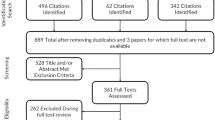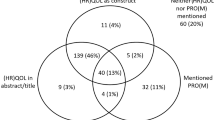Abstract
The objective of this study was the development and psychometric evaluation of the quality of life questionnaire for patients with progressive neurological diseases in the advanced stage of the disease. The study comprised 333 patients with severe progressive neurological disease (mean age: 65.4; 56% females). The development questionnaire was tested: convergent validity (confirmatory factor analysis), reliability (Cronbach alpha), test-retest reliability, correlation analysis, construct validity (Spearman coefficient). Acceptable reliability was found in all domains of the PNDQoL questionnaire (α = 0.727–0.834), test-retest reliability (r = 0.721–0.980; p < 0,001). The PNDQoL questionnaire is a valid and is suitable for patients in advanced stages of the disease. It may be used to analyze the impact of the disease and its treatment on patients´ life.
Similar content being viewed by others
References
Albers, G., Vet, H., Echteld, M., & Onwuteaka-Philipsen, B. (2010). Evaluation of quality of life measures of use in palliative care: A systematic review. Palliative Medicine, 24(1), 17–37. https://doi.org/10.1177/0269216309346593
Boeteng, G. O., Neilands, T. B., Frongillo, E. A., Melgar-Quinonez, H. R., & Young, S. L. (2018). Best practices for developing and validating scales for health, social and behavioral research: A primer. Frontiers in Public Health, 6, 149. https://doi.org/10.3389/fpubh.2018.00149
Bruera, E., Kuehn, N., Miller, M. J., Selmser, P., & Macmilan, K. (1991). The Edmonton Symptom Assessment System (ESAS): A simple method of the assessment of palliative care patients. Journal of Palliative Care, 7(2), 6–9.
Cella, D. (2011). The neurology quality of life measurement initiative. Archive of Physical Medicine Rehabilitation, 92(10), 28–36. https://doi.org/10.1016/j.apmr.2011.01.025
Cella, D., Nowinski, C. J., Lai, J. S., & Victorson, D. (2012). Neuro-QOL: Brief measures of health-related quality of life for clinical research in neurology. Neurology, 78(23), 1860–1867. https://doi.org/10.1212/WNL.0b013e318258f744
Clay, E., Guelfucci, F., Dorey, J., Tedroff, J., Verny, C., Tuni, M., & Aballea, S. (2010). Huntington quality of life interview (HQoLI): A new Huntington’s disease-specific quality of life instrument. Value in Health, 13(7), 244–A2A23. https://doi.org/10.1136/jnnp.2010.222620.3
Cohen, S. R., Leis, A., Russell, L. B., & Shahidi, J. (2019). More comprehensively measuring quality of life in life-threatening illness: The McGill quality of life questionnaire – Expanded. BMC Palliative Care, 18(1), 92. https://doi.org/10.1186/s12904-019-0473-y
Corless, I. B., Nicholas, P. K., & Nokes, K. M. (2001). Issues in cross-cultural quality-of-life research. Journal of Nursing Scholarship, 33(1), 15–20.
De Boer, A. G., Wijker, W., Speelman, J. D., & de Haes, J. C. (1996). Quality of life in patients with Parkinson’s disease: Development of a questionnaire. Journal of Neurology and Neurosurgery, 61(1), 70–74. https://doi.org/10.1136/jnnp.61.1.70
Ford, H. L. (2001). Developing a disease-specific quality of life measure for people with multiple sclerosis. Clinical Rehabilitation, 15(3), 247–258. https://doi.org/10.1191/026921501673658108
Franceschini, A. C., & Mourao, L. F. (2015). Dysarthria and dysphagia in amyotrophic lateral sclerosis with spinal onset: A study of quality of life related to swallowing. NeuroRehabilitation, 36(1), 127–134. https://doi.org/10.3233/NRE-141200
Gold, S.M., Heesen, C., Schulz, H., Guder, Monch, A., Gbadamosi, J., Buhmann, C. & Schulz, K.H. (2001). Disease specific quality of life instruments in multiple sclerosis: Validation of the Hamburg Quality of Life Questionnaire in Multiple Sclerosis (HAQUAMS). Multiple Sclerosis Journal, 7(2), 119–130. doi: https://doi.org/10.1177/135245850100700208.
Haase, J.E., & Braden, C.J. (2003). Conceptualization and measurement of quality of life and related concepts: Guidelines for clarity. In. King, C.R. et al. Quality of life from nursing and patient perspectives. Jones and Barlett Publishers, 65-91.
Hamplová, D. (2011). Religion and gender: Why are women more religious than men? Czech Sociological Review, 47(2), 297–323.
Hendl, J. (2009). Přehled statistických metod zpracování dat: Analýza a metaanalýza dat. Portál.
Hnilicová, H. (2005). Kvalita života a její význam pro medicínu a zdravotnictví. In: Payne et al. Kvalita života a zdraví. (Quality of life and health). Praha: Triton, 205-216.
Hocaoglu, M. B., Gaffan, E. A., & Ho, A. K. (2012). Health-related quality of life in Huntington’s disease patients: A comparison of proxy assessment and patient self-rating using the disease-specific Huntington’s disease health-related quality of life questionnaire (HDQoL). Journal of Neurology, 259(9), 1793–1800. https://doi.org/10.1007/s00415-011-6405-2
Hooper, D., Coughlan, J., & Mullen, R. (2008). Structural equation modeling: Guidelines for determining model fit. Electronic Journal of Business Research Methods, 6, 53–60.
Hu, L., & Bentler, P. M. (1999). Cutoff criteria for fit indexes in covariance structure analysis: Conventional criteria versus new alternatives. Structural Equation Modeling, 6(1), 1–55. https://doi.org/10.1080/10705519909540118
Hussain, J., Adams, D., & Campbell, C. (2013). End-of-life care in neurodegenerative conditions: Outcomes of a specialist palliative neurology service. International Journal of Palliative Nursing, 19(4), 162–169. https://doi.org/10.12968/ijpn.2013.19.4.162
Jenkinson, C., & Fitzpatrick, R. (2001). Reduced item set for the amyotrophic lateral sclerosis assessment questionnaire: Development and validation of the ALSAQ-5. Journal of Neurology and Neurosurgery Psychiatry, 70(1), 70–73. https://doi.org/10.1136/jnnp.70.1.70
Jenkinson, C., Levvy, G., & Fitzpatrick, R. (2000). The amyotrophic lateral sclerosis assessment questionnaire (ALSAQ-40): Tests of data quality, score reliability and response rate in a survey of patients. Journal of Neurology Science., 180(1–2), 94–100. https://doi.org/10.1016/s0022-510x(00)00420-2
Křivohlavý, J. (2002). Psychologie nemoci. Grada Publishing, 279 s.
Mokkink, L. B., Terwee, C. B., Patrick, D. L., Alonso, J., Stratford, P. W., Knol, D. L., Bouter, L. M., & de Vet, H. C. (2010). The COSMIN checklist for assessing the methodological quality of studies on measurement properties of health status measurement instruments: An international Delphi study. Quality of Life Research, 19(4), 539–549. https://doi.org/10.1007/s11136-010-9606-8
Peterson, R. A. (1994). A Meta-analysis of Cronbach’s coefficient alpha. Journal of Consumer Research, 21(2), 381–391.
Peto, V., Jenkinson, C., Fitzpatrick, R., & Greenhall, R. (1995). The development and validation of a short measure of functioning and wellbeing for individuals with Parkinson’s disease. Quality of Life Research, 4(3), 241–248. https://doi.org/10.1007/BF02260863
Simeoni, M., Auquier, P., Fernandez, O., Flachenecker, P., Stecchi, S., et al. (2008). Validation of the sclerosis international quality of life questionnaire. Multiple Sclerosis Journal, 14(2), 219–230. https://doi.org/10.1177/1352458507080733
Simmons, Z. (2010). Validation of a shorter ALS specific quality of life instrument: The ALSQOL-R. Neurology, 74(supl2), A177–A178.
Steiner, D. L., & Norman, G. R. (2003). Health measurement scales. A practical guide to their development and use. Oxford University Press.
Stiel, S., Pastrana, T., Balzer, C., Elsner, F., Ostgathe, C., & Radbruch, L. (2012). Outcome assessment instruments in palliative and hospice care – A review of the literature. Supportive Care in Cancer, 20(11), 2879–2893. https://doi.org/10.1007/s00520-012-1415-x
Terwee, C. B., Bot, S. D., de Boer, M. R., van der Windt, D. A., Knol, D. L., Deffer, J., Bouter, L. M., & de Vet, H. C. (2007). Quality criteria were proposed for measurement properties of health status questionnaires. Journal of Clinical Epidemiology, 60(1), 34–42. https://doi.org/10.1016/j.jclinepi.2006.03.012
The Consortium of Multiple Sclerosis Centers Health Services Research Subcommittee, funded by National Multiple Sclerosis Society (1997). Multiple sclerosis quality of life inventory: A User’s Manual. National Multiple Sclerosis Society, 65 s.
Vickrey, B. G., Harooni, R., Myers, L. W., & Ellison, G. W. (1995). A health-related quality of life measure for multiple sclerosis. Quality of Life Research, 4, 187–206.
Wagner, A. K., Gandek, B., Aaronson, N. K., Aquadro, C., Alonso, J., Apolone, G., Bullinger, M., Bjorner, J., Fukuhara, S., Kaasa, S., Leplege, A., Sullivan, M., Wood-Dauphinee, S., & Ware Jr., J. E. (1998). Cross-cultural comparisons of the content of SF-36 translations across 10 countries: Results from the IQOLA project. Journal of Clinical Epidemiology, 51, 925–932.
Ware, J. E., & Gandek, B. (1998). Methods for testing data quality, scaling assumptions, and reliability: The IQOLA project approach. International quality of life assessment. Journal of Clinical Epidemiology, 51(11), 945–952. https://doi.org/10.1016/s0895-4356(98)00085-7
Welsh, M., McDermott, M. P., Holloway, R. G., Plumb, S., Pfeiffer, R., & Hubble, J. (2003). Development and testing of the Parkinson’s disease quality of life scale. Movement Disorders, 18(6), 637–645. https://doi.org/10.1002/mds.10424
Wilson, I. B., & Cleary, P. D. (1995). Linking clinical variables with health-related quality of life: A conceptual model of patient outcomes. Journal of the American Medical Association, 273(1), 59–65.
Funding
This study was funded by Ministry of Health, Czech republic (grant AZV MZ CR number 17-29447A).
Author information
Authors and Affiliations
Contributions
All authors contributed to the study conception and design. Material preparation, data collection, and analysis were performed by [RB] and [RK]. The first draft of the manuscript was written by [RB] and author RK commented on previous versions of the manuscript. Both authors read and approved the final manuscript.
Corresponding author
Ethics declarations
Ethics Approval
The study conformed to the provisions of the Declaration of Helsinki, and was approved by the ethics committees of University Hospital Ostrava (no. 486/2016).
Consent to Participate
All subjects gave their informed consent to inclusion before they participated in the study.
Consent for Publication
All authors agree with publication of this article.
Conflicts of Interest/Competing Interests
The authors declare that they have no conflict of interest.
Additional information
Publisher’s Note
Springer Nature remains neutral with regard to jurisdictional claims in published maps and institutional affiliations.
Rights and permissions
About this article
Cite this article
Bužgová, R., Kozáková, R. Development and psychometric evaluation of a progressive neurological disease quality of life questionnaire (PNDQoL). Curr Psychol 42, 8279–8289 (2023). https://doi.org/10.1007/s12144-021-02183-8
Accepted:
Published:
Issue Date:
DOI: https://doi.org/10.1007/s12144-021-02183-8




